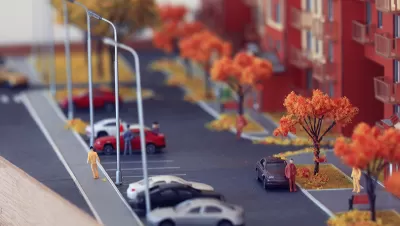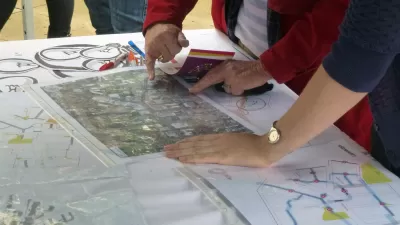A recent study describes the evolution of planning has become far too sensitive to government thinking (i.e., fiscal conservatism and economic logic) instead of the emotional processes of citizens.

Henry Grabar poses a big question for the practice of planning in a recent article for Next City: "Why does the planning world seem determined to resist approaches that give primacy — or even credence — to the way people feel?"
To ponder the question, Grabar cites a recent study by Howell Baum, a professor emeritus of urban studies at the University of Maryland, titled "Planning with half a mind: Why planners resist emotion" [pdf]. According to Baum, as explained by Grabar, "rationalism has become a harmful bias in planning" as a result of the formalization of the planning profession.
Throughout the article, Grabar responds to the ideas put forward by Baum's study, even calling some of Baum's examples of "emotionally sensitive planning" as outlandish, but allows Baum plenty of space on the page to posit a new, more emotionally aware practice of planning.
FULL STORY: Getting Emotional About Urban Planning

Trump Administration Could Effectively End Housing Voucher Program
Federal officials are eyeing major cuts to the Section 8 program that helps millions of low-income households pay rent.

Planetizen Federal Action Tracker
A weekly monitor of how Trump’s orders and actions are impacting planners and planning in America.

Ken Jennings Launches Transit Web Series
The Jeopardy champ wants you to ride public transit.

California Invests Additional $5M in Electric School Buses
The state wants to electrify all of its school bus fleets by 2035.

Austin Launches $2M Homelessness Prevention Fund
A new grant program from the city’s Homeless Strategy Office will fund rental assistance and supportive services.

Alabama School Forestry Initiative Brings Trees to Schoolyards
Trees can improve physical and mental health for students and commnity members.
Urban Design for Planners 1: Software Tools
This six-course series explores essential urban design concepts using open source software and equips planners with the tools they need to participate fully in the urban design process.
Planning for Universal Design
Learn the tools for implementing Universal Design in planning regulations.
Ada County Highway District
Clanton & Associates, Inc.
Jessamine County Fiscal Court
Institute for Housing and Urban Development Studies (IHS)
City of Grandview
Harvard GSD Executive Education
Toledo-Lucas County Plan Commissions
Salt Lake City
NYU Wagner Graduate School of Public Service





























